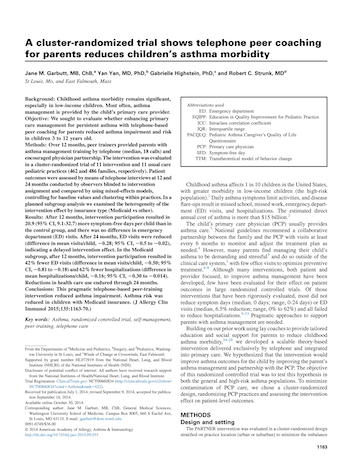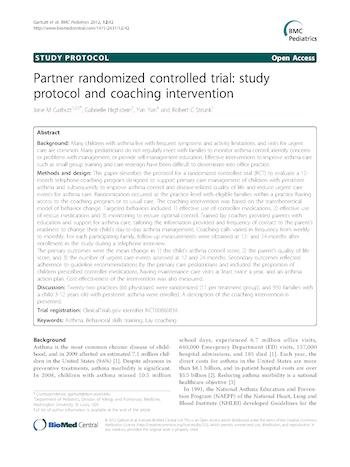Asthma – PARTNER Study
2008-2013
A cluster-randomized trial shows telephone peer coaching for parents reduces children’s asthma morbidity
May 1, 2015
Garbutt JM, Yan Y, Highstein G, Strunk RC. A cluster-randomized trial shows telephone peer coaching for parents reduces children’s asthma morbidity. J Allergy Clin Immunol. 2015 May;135(5):1163-70.e1-2. doi: 10.1016/j.jaci.2014.09.033. Epub 2014 Oct 30. PMID: 25445827; PMCID: PMC4416070.
Background
Childhood asthma morbidity remains significant,especially in low-income children. Most often, asthma management is provided by the child’s primary care provider.
Objective
We sought to evaluate whether enhancing primary care management for persistent asthma with telephone-based peer coaching for parents reduced asthma impairment and risk in children 3 to 12 years old.
Methods
Over 12 months, peer trainers provided parents with asthma management training by telephone (median, 18 calls) and encouraged physician partnership. The intervention was evaluated in a cluster-randomized trial of 11 intervention and 11 usual care pediatric practices (462 and 486 families, respectively). Patient outcomes were assessed by means of telephone interviews at 12 and 24 months conducted by observers blinded to intervention assignment and compared by using mixed-effects models,controlling for baseline values and clustering within practices. In a planned subgroup analysis we examined the heterogeneity of the intervention effect by insurance type (Medicaid vs other).
Results
After 12 months, intervention participation resulted in 20.9 (95% CI, 9.1-32.7) more symptom-free days per child than in the control group, and there was no difference in emergency department (ED) visits. After 24 months, ED visits were reduced(difference in mean visits/child, 20.28; 95% CI, 20.5 to 20.02),indicating a delayed intervention effect. In the Medicaid subgroup, after 12 months, intervention participation resulted in 42% fewer ED visits (difference in mean visits/child, 20.50; 95%CI, 20.81 to 20.18) and 62% fewer hospitalizations (difference in mean hospitalizations/child, 20.16; 95% CI, 20.30 to 20.014).Reductions in health care use endured through 24 months.
Conclusions
This pragmatic telephone-based peer-training intervention reduced asthma impairment. Asthma risk was reduced in children with Medicaid insurance.
Partner randomized controlled trial: study protocol and coaching intervention
April 2, 2012
Garbutt JM, Highstein G, Yan Y, Strunk RC. Partner randomized controlled trial: study protocol and coaching intervention. BMC Pediatr. 2012 Apr 2;12:42. doi: 10.1186/1471-2431-12-42. PMID: 22469168; PMCID: PMC3352109.
Background
Many children with asthma live with frequent symptoms and activity limitations, and visits for urgent care are common. Many pediatricians do not regularly meet with families to monitor asthma control, identify concerns or problems with management, or provide self-management education. Effective interventions to improve asthma care such as small group training and care redesign have been difficult to disseminate into office practice.
Methods and Design
This paper describes the protocol for a randomized controlled trial (RCT) to evaluate a 12-month telephone-coaching program designed to support primary care management of children with persistent asthma and subsequently to improve asthma control and disease-related quality of life and reduce urgent care events for asthma care. Randomization occurred at the practice level with eligible families within a practice having access to the coaching program or to usual care. The coaching intervention was based on the transtheoretical model of behavior change. Targeted behaviors included 1) effective use of controller medications, 2) effective use of rescue medications and 3) monitoring to ensure optimal control. Trained lay coaches provided parents with education and support for asthma care, tailoring the information provided and frequency of contact to the parent’s readiness to change their child’s day-to-day asthma management. Coaching calls varied in frequency from weekly to monthly. For each participating family, follow-up measurements were obtained at 12- and 24-months after enrollment in the study during a telephone interview.
The primary outcomes were the mean change in 1) the child’s asthma control score, 2) the parent’s quality of life score, and 3) the number of urgent care events assessed at 12 and 24 months. Secondary outcomes reflected adherence to guideline recommendations by the primary care pediatricians and included the proportion of children prescribed controller medications, having maintenance care visits at least twice a year, and an asthma action plan. Cost-effectiveness of the intervention was also measured.
Discussion
Twenty-two practices (66 physicians) were randomized (11 per treatment group), and 950 families with a child 3-12 years old with persistent asthma were enrolled. A description of the coaching intervention is presented.

